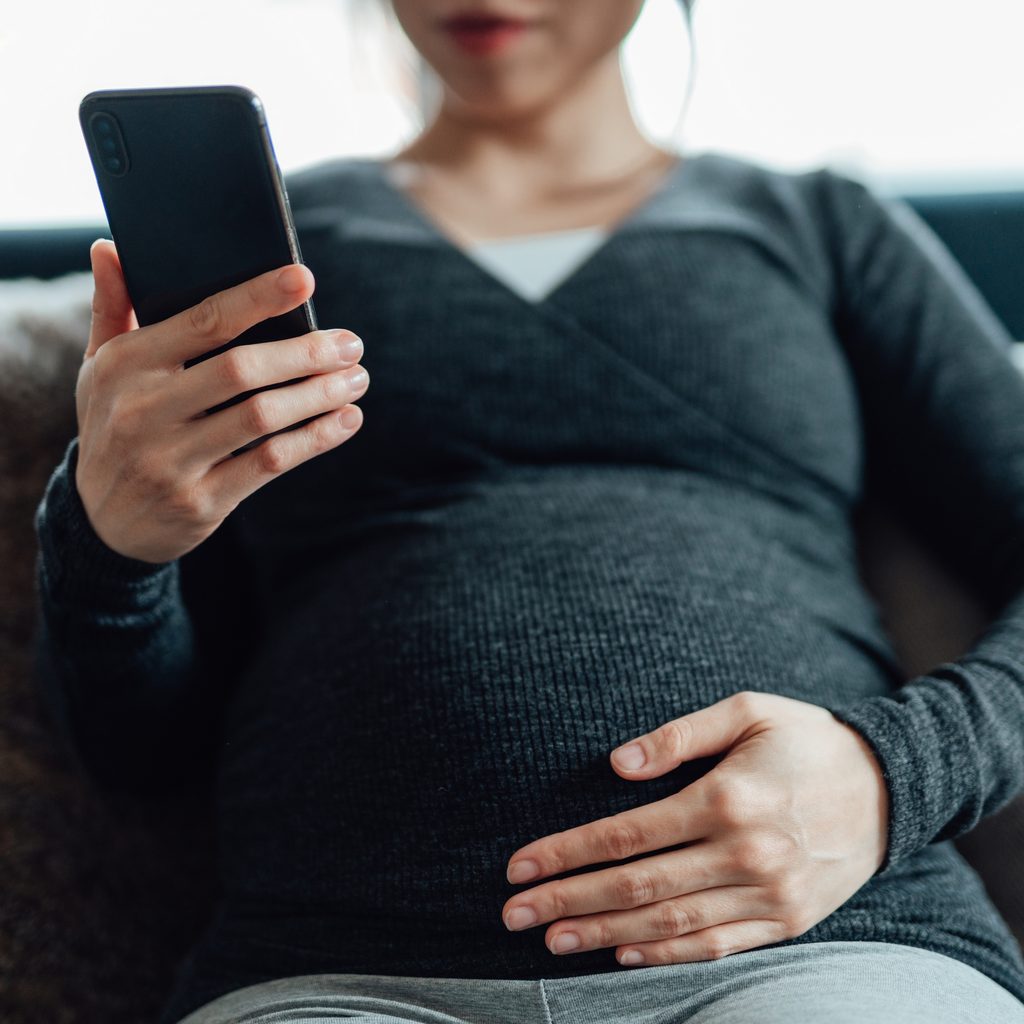Being sick is never fun, but being sick while pregnant, especially if you experience a fever during pregnancy, can cause a lot of anxiety. A fever can be extremely scary for any expectant parent, especially if they don't know what's causing it. Not only is a fever during pregnancy (or a body temperature over 100.4 degrees Fahrenheit) stressful for the pregnant person but it can also be worrying for their loved ones because a fever can cause a lot of concern for the health of the unborn child as well. If an expecting person’s body produces an elevated temperature, especially during the first trimester, that affects the baby in utero as well.
But what can a pregnant person take for a fever? It's a serious question with a serious answer because everything changes once there's a pregnancy involved. If you are expecting or have someone in your life who will be welcoming a new bundle of joy soon, we urge you to pay attention to these tips and information on handling fevers while pregnant.

Stay calm
As a pregnant person who’s found herself overheated — or warm to the touch — it’s completely normal to become alarmed at the possibility of being ill. Here are some steps to take if you start to feel a fever coming on while pregnant.
Step 1: If you have a fever the most important thing to do is to stay calm. Staying calm redirects feelings of anxiety and allows the expectant parent to focus their energies on diagnosing and treating their possible issue(s).
Step 2: Confirming the suspected fever is the next step in handling the situation. Ensure you’re testing your body temperature with a clean and working thermometer.
Step 3: Repeat the procedure at least twice to confirm an accurate reading has been taken. A fever is considered such when the human body reaches a temperature of 100.4 degrees Fahrenheit or higher.
Step 4: Once you have confirmed that you have what’s classified as an active fever, the next step in treating the issue is contacting your OBGYN. It’s important to do this, especially in high-risk pregnancy situations, to obtain exact and up-to-date treatment for the fever by the doctor who is following the pregnancy.
Step 5: Identify other symptoms. A fever can be indicative of other problems, and the March of Dimes notes that you should contact your doctor immediately if your fever is accompanied by other symptoms including severe thirst, dark urine or are peeing less, vaginal discharge with a bad smell, dizziness, severe cramps, or trouble breathing.

Next steps
Depending on the temperature and the personal health information of the patient, the OBGYN might request that you come in to be seen in the office for further testing and diagnostics. These types of scenarios usually only occur when fevers are accompanied by correlated symptoms that could be attributed to:
- Urinary tract infections (UTIs)
- Bacterial or viral infections
- Food poisoning

What can pregnant people take for a fever?
You’ve stayed calm, confirmed your fever, and spoken with your doctor about any high-risk issues or special medical situations, and now you’re ready to start treating the problem. The first, and best, thing to do when you’ve discovered a fever as an expecting parent is to take the recommended dosage of acetaminophen. This medication, also known by the brand name, Tylenol, is the first line of defense in treating fevers.
Acetaminophen has been proven safe for pregnant people and small children to ease discomfort and fevers due to its ability to lower the body’s core temperature without causing internal damage. Dr. Laura Laursen, a practicing OBGYN from Chicago talked to Insider about Tylenol and its uses during pregnancy stating, “Tylenol is one of the front-line pain meds that we use during pregnancy. It's safe from your first trimester through the third."

Stay hydrated!
It’s also crucial to stay hydrated by drinking lots of fluids, especially water. By keeping your pregnant body as hydrated as possible, you are supplying yourself and your baby with a valuable tool it needs to cool itself internally. You should also dress yourself in lightweight and breathable fabrics. Now is the time to reach for those soft and comfortable cotton T-shirts and oversized pajama bottoms.
This gives your skin the chance to breathe, sweat, and cool naturally without any restrictive materials covering it. You can also take a lukewarm bath to help bring your temperature down. By soaking your overheated skin in a tub filled with lukewarm water, you’re physically changing the temperature of your body and bringing its core temperature down gradually. This soothing time spent in the tub can also double as essential self-care for expecting parents.
Use the time to relax or simply space out for a few minutes of precious “you time.” You can also stay inside and use a fan to remain cool.

What causes a fever during pregnancy?
A fever during pregnancy can be alarming, especially if you don't normally find yourself under the weather. But the reality is that since your immune system is working overtime to keep you and your baby healthy, it's not uncommon for you to succumb to any of those pesky viruses and illness that always seem to be around.
You may be more susceptible to the common cold or the flu during pregnancy, which could result in a fever. Infections like we mentioned above can also cause a fever, as can contracting the coronavirus. You may want to get tons of rest and drink lots of fluid when feeling under the weather, but it's important to remember that you should always contact your doctor if your temperature reaches over 100 degrees Fahrenheit.

Can a fever harm your unborn baby?
It's understandable to be worried about your baby's health if you do come down with a fever. According to the March of Dimes, having a fever early in pregnancy may result in a great risk of neural tube defects. In addition to increasing your risk of preterm labor, having a fever over 103F in the first trimester may increase the risk of cleft lip and cleft palate, congenital heart defects, and miscarriage. This is why it's so important to contact your doctor immediately if you develop a fever.

When to go to the ER
If you have a fever that is 100.4 degrees Fahrenheit or higher, especially if it is persistent or accompanied by other concerning symptoms, you should visit the emergency room. High fever during pregnancy can indicate an infection, such as the flu, urinary tract infection, or even more serious conditions like chorioamnionitis (a bacterial infection of the placenta and amniotic fluid).
If your fever is accompanied by severe abdominal pain, chills, difficulty breathing, a rapid heart rate, decreased fetal movement, or signs of dehydration like dizziness and reduced urination you should also seek emergency medical care immediately.
Whether you decide to do one thing or another, it’s always recommended to speak with your doctor prior to taking any medications or engaging in any activities that might put yourself or your baby at risk. Communication between you and your OBGYN paramount when treating any kind of ailments.
Fevers, while normal at any stage during pregnancy when isolated and self-treated, can also be a sign of a more extensive problem at play, making discussions between you and your doctor even more vital.




